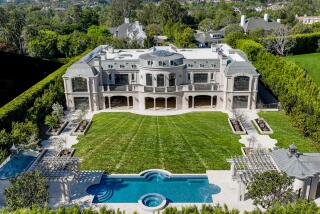Spelling’s Chateau Going on Market?
- Share via
In the rarefied realm of ultra-deluxe Southern California real estate, it appears there is no such thing as requiescat in pace. Or even a decent interval, for that matter.
Despite denials by those involved, speculation persists that Candy Spelling, the widow of the recently deceased TV mogul Aaron Spelling, is planning to place the family’s famous 56,500-square-foot Holmby Hills mansion on the market. The price for the 45-room, six-acre property? According to one gossip website: $150 million.
For the record:
12:00 a.m. July 8, 2006 For The Record
Los Angeles Times Saturday July 08, 2006 Home Edition Main News Part A Page 2 National Desk 3 inches; 108 words Type of Material: Correction
Spelling mansion: A story in Friday’s California section about the Holmby Hills residence of the late Aaron Spelling and his wife, Candy, incorrectly said the mansion has 45 rooms. It has 123. The story also incorrectly said that the highest price of a residential real estate sale in the U.S. was the $70 million paid for businessman Ronald Perelman’s estate in Palm Beach, Fla., two years ago and that the local record was the $47.5 million that David Geffen paid for a Beverly Hills estate 16 years ago. In both cases, the record is the $94-million purchase of a Bel-Air estate by telecommunications executive Gary Winnick in 2000.
The item, on tmz.com, cited one source as saying Candy Spelling had let go many members of the mansion’s staff so that she could shut the house down and allow agents to show it.
Kevin Sasaki, a spokesman for the Spellings, insisted Thursday that the manor was not on the market. He also dismissed the web report that members of the 30-person staff had been laid off to enable real estate agents to market the house in what is known as a “pocket listing,” a quiet shopping around of a property.
“She is still in mourning. You would think that people would show more respect,” Sasaki said. “She may never sell the house because she loves it so much and had a lot to do with planning it and seeing that it was built.”
Stephen Shapiro, a co-founder and chairman of Beverly Hills-based Westside Estate Agency, which the website linked to the sale, called the report “erroneous.”
But that didn’t stop Shapiro’s publicist from suggesting that he serve as a source for a story about the potential effects such a sale might have. And his answer was: No effect at all, other than serving as a testament to the cachet of Los Angeles real estate.
“It wouldn’t be a comp for anything else,” Shapiro said, referring to the practice of using comparable sales as a guide. “We would love to have the listing, if and when the time comes,” he added wishfully.
Construction on the mansion, built in the style of a French chateau, began in 1986, quickly turning the corner of Mapleton and Club View drives into a looky-loos’ paradise. The two-story manse features a screening room, a gym, a one-lane bowling alley and a bonus level for closets between the second story and the attic. It was, depending on one’s perspective, either an architectural wonder or an obnoxious eyesore. At the time, everyone seemed to have an opinion.
Holmby Hills is part of the renowned Platinum Triangle that also includes Bel-Air and Beverly Hills and has for a century been home to some of the world’s priciest real estate.
Yet it was just 30 years ago that the area saw its first million-dollar home sale, when Hugh Hefner bought the Holmby Hills estate now known as the Playboy Mansion.
In recent years -- thanks to the booming Southern California real estate market -- home prices in the Triangle have skyrocketed, as they have just about everywhere else. What three years ago would have been a $5-million property is commanding $10 million today. Last year, 41 homes sold for $10 million-plus on the Westside, up from 25 the year before.
There are now 23 homes in the Platinum Triangle listed for $10 million or more. The highest-priced is a palatial estate sitting on three acres in Bel-Air, offered for $53 million. And those are the “official” listings, shared among the elite coterie of real estate agents who operate in this realm and have access to the kinds of people willing to plunk down multiple millions for a ritzy Westside address.
But $150 million would be a new record by any measure. The highest residential sale in the United States was the $70 million paid for businessman Ronald Perelman’s estate in Palm Beach, Fla., two years ago. The local record is the $47.5 million that David Geffen paid for a Beverly Hills estate 16 years ago.
A $150-million sale would even trump Donald Trump, who has a house on the market in Florida for $125 million.
How do homes get priced? Location, of course, matters, said Rick Goodwin, the New Jersey-based publisher of Ultimate Homes and Unique Homes magazines. The size of the house is important too, as are other tangible assets such as views, condition and lot size.
Intangible assets such as the property’s “provenance” -- who built it and who previously owned it -- also play a role.
“The fact Aaron Spelling lived there and built it is not a bad thing,” Goodwin said. “Properties like this don’t come on the market that often.”
Spelling was a TV legend known for such series as “Dynasty,” “Charlie’s Angels,” “The Love Boat” and “Beverly Hills, 90210.” He died in the mansion on June 23.
Goodwin and other experts said that if the Spelling estate does sell, it’s likely the public won’t know until it’s a done deal.
“The number of people who can afford it is so small that probably someone in the local real estate community already knows somebody who may be interested,” he said. “It’s not something that needs to be marketed to the masses,” Goodwin added.
Wealthy people have always sought to distinguish themselves from the hoi polloi through their homes. What’s happening now is that there are that many more rich people wishing to express their success in a big way.
“What we’re seeing is the billionaire wanting to set himself apart from the mere millionaire,” Goodwin said. “They are making a move up to say, ‘I’m on a different level.’ ”
*
Times staff writers Ruth Ryon and Roger Vincent contributed to this report.
More to Read
Sign up for Essential California
The most important California stories and recommendations in your inbox every morning.
You may occasionally receive promotional content from the Los Angeles Times.







